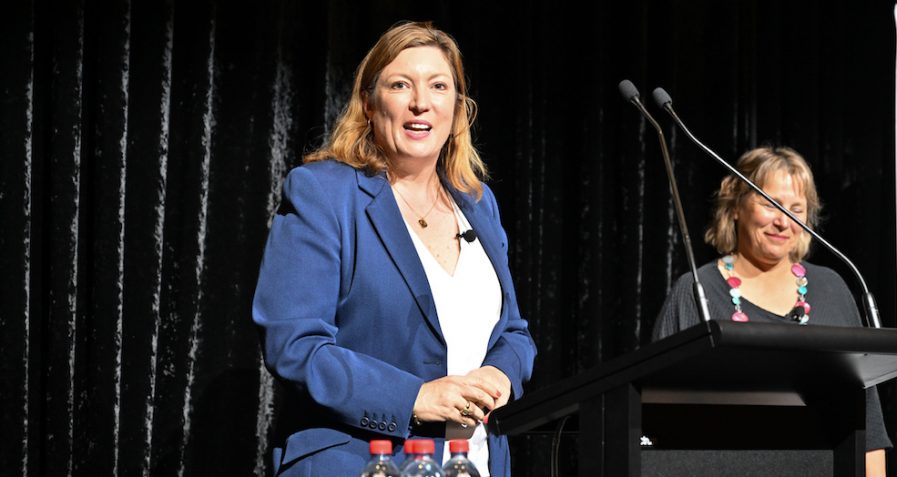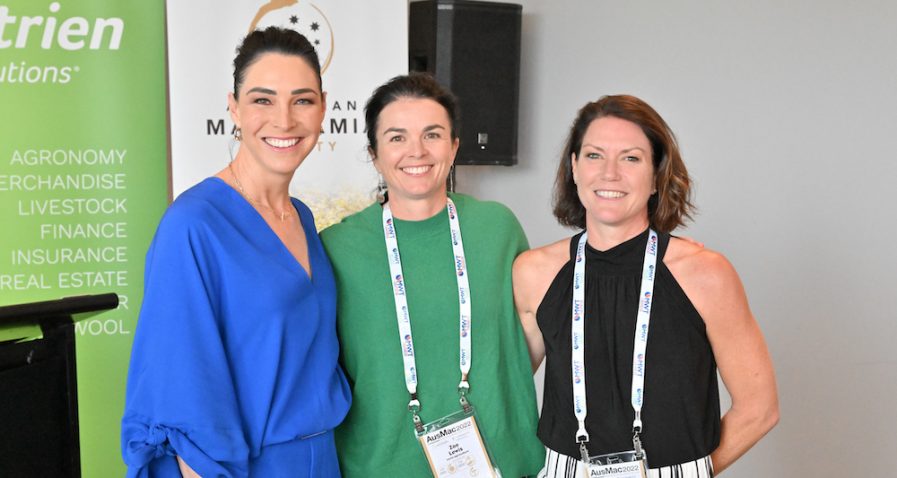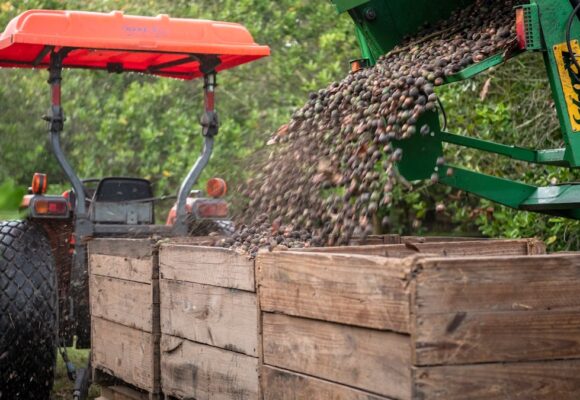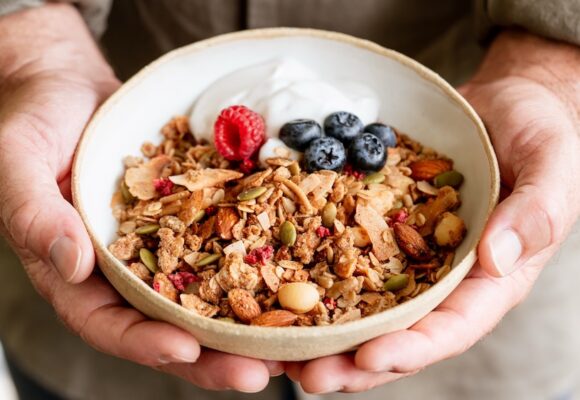AusMac, the Australian macadamia industry conference, returned to Australia’s Gold Coast this month after two years of pandemic-related postponements. With more than 700 delegates spanning all sectors of the industry, it was the largest conference ever hosted and provided a highly anticipated opportunity to network, learn, and get up to speed on everything from global macadamia production and marketing to the latest in agri-tech and regenerative agriculture.
Here’s a look at some of the highlights.

Working with the World Macadamia Organisation to drive awareness and demand
The World Macadamia Organisation (WMO) recently celebrated its first anniversary. CEO Jillian Laing took to the stage alongside Australian Macadamias Market Development Manager Jacqui Price to share an update on how the two organisations are working collaboratively to share the multi-layered macadamia narrative with consumers globally.

“The future for macadamias is really positive,” Jillian told delegates. “We know that nuts are popular and that is going to keep growing over time. Macadamias are a rare and special nut, with a really good health story that is aligned to global health trends. And of course they deliver on taste.”
Jillian also explained that the WMO’s purpose is “to champion the potential of macadamias as a mindful wholefood. And through building the love for macadamias, ensuring a strong, sustainable industry into the future.”
Jacqui Price said the Australian macadamia industry’s messaging and objectives align with those of the WMO. “The WMO is here to stimulate growth and drive consumption, and Australian Macadamias does that too through our health, taste, indulgence and versatility messaging,” Jacqui said. “However we have another layer to our story, which is that of Australia as the natural home of the macadamias and the benefits that stem from our position as an industry leader. The Australian macadamia suppliers then have their own brand stories that feed into that. So collectively we all work really well together,” she said.
Sustainable macadamia growing in the spotlight
Australia is recognised around the world as a clean, green and reliable food producer, and our macadamia industry is committed to farming for a sustainable future. This year’s conference featured regenerative agriculture sessions run by Dr John Grant, Research Fellow from Southern Cross University and agroecologist Dr Abigail Makim.
Designed to showcase the regenerative techniques making the biggest impacts in macadamia growing, the sessions covered a host of topics including cover crops, inter row technology, organic nutrient requirements and composting, bio sequestration and riparian zone restoration. Growers were provided with a wealth of information to help improve soil health in the orchard and maximise vegetative diversity to attract beneficial insects and help regulate soil moisture and temperature.
In a separate presentation, Australian Macadamias industry development manager Leoni Kojetin acknowledged that the term ‘sustainability’ is broad and means different things to different people and that this can differ by region as well.
“Essentially, sustainability means meeting the needs of the present without compromising the ability of future generations to meet their own needs,” she said. “Consumer buying is increasingly values driven. People want to eat to make the world better. The global trading environment has changed with environmental, social and corporate governance considerations increasingly driving investment and purchasing decisions.”

As Jacqui Price explained, consumers want companies to take action. “They’re looking to manufacturers, retailers and government entities to prioritise sustainable practices. The macadamia industry understands this and is aligned with several international and domestic sustainability initiatives.”
The overarching message was that Australia’s macadamia industry can be proud of the sustainable practices it has already embraced, but there is still much to be done. “Sustainability is increasingly important, and it’s fast becoming part of trade negotiations,” Leoni said. “There’s a lot we can learn from other industries, and we are working to a strong framework. But we need to continually monitor our objectives and add more layers to the framework that’s been established.”
Celebrity chef breakfast delivers on taste (and entertainment)
The celebrity chef breakfast has become a tradition of AusMac and this year was no exception. Dublin-born chef and restaurateur Colin Fassnidge is a popular Australian TV personality thanks to his eight-year tenure as a judge on top-rating program My Kitchen Rules.

The cheeky and outspoken Irishman kept everyone entertained – and MC Giaan Rooney on her toes – when he took to the stage to demonstrate how to make two macadamia breakfast recipes he had developed – Macadamia and Halloumi Fritters followed by Macadamia and Date Breakfast Muffins with Macadamia and Lemon Myrtle Crème Fraiche, with everyone experiencing the delicious dishes for themselves.

Colin loves to use macadamias on the menu of his restaurant Banksia Bistro and shared many examples including macadamia milk poached pork neck, macadamia milk ice cream, macadamia fish crust and chicken stuffing, banana bread with pineapple and macadamia nuts, and avocado and macadamia nut chilli spread.
Women in Macadamias lunch
2022 saw our industry hold its inaugural Women in Macadamias events, which were highly successful. To follow on from this, a special Women in Macadamias lunch was held at the conference, hosted by Australian Olympic swimming champion and macadamia grower Giaan Rooney.

It was a fantastic opportunity for women from across the industry to gather and enjoy a macadamia inspired lunch while learning from each other’s experiences.
Macadamia grower Dianne Vere hosted one of the Women in Macadamias events at her farm earlier in the year and addressed the women who attended the lunch.
“You can learn so much when women get together and feel they can talk and be themselves,” she said. “I’d encourage all our industry’s women to get involved in future women’s initiatives. I feel this is such a great industry and if women support each other, we can make it even better.”
Collaborative spirit alive and well
The Australian macadamia industry is known for its collaborative and innovative spirit, and this was evident throughout AusMac2022.
Industry experts shared their knowledge across a host of topics including orchard best practice, pollination, water use management and the technology that’s changing the face of orchard management. Several of our industry’s growers were also centre stage for a series of grower case studies, generously sharing their growing experiences to help and inspire others on the same path.
Elle Revell is a macadamia grower from the Northern Rivers region, and along with her family, has developed orchard management solutions that are tailored to their situation, orchard and future goals. The family has a cotton growing background and had to adapt to a new industry when they decided to make the switch to macadamia farming.
“Macadamias require a different way of thinking compared to cotton or vegetables,” Elle shared. “My family was looking for something with more rainfall and we’ve definitely got that! It’s been a nice lifestyle change and a big challenge.”
Elle said they benefited greatly from attending industry events, field days, and production and mechanics courses, and this armed them to implement substantial changes as they renewed the orchard they took over in 2019.

To all the sponsors, exhibitors and delegates who supported AusMac2022, we thank you for helping to make this important industry event such a success. If you have questions about any of the information presented please feel free to contact Australian Macadamias Market Development Manager Jacqui Price


